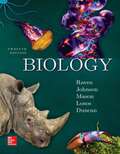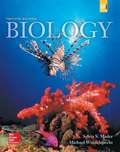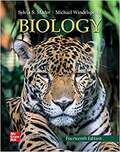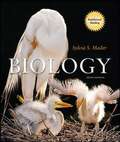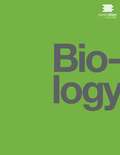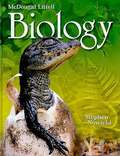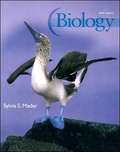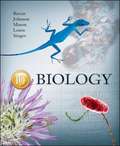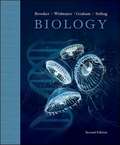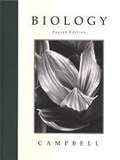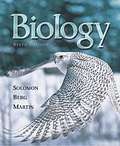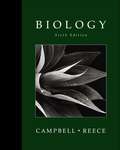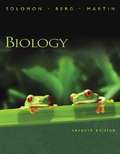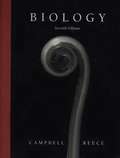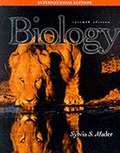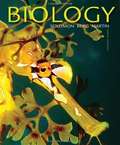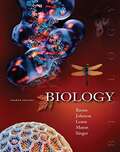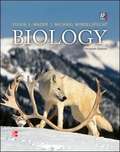- Table View
- List View
Biology
by Peter H. Raven Jonathan B. Losos Susan R. Singer Kenneth A. MasonTheRaven & Johnson's Biology author team is committed to continually improving the text, keeping the student and learning foremost. The integrated pedagogical features expand the students' learning process and enhance their learning experience. This latest edition of the text maintains the clear, accessible, and engaging writing style of past editions with the solid framework of pedagogy that highlights an emphasis on evolution and scientific inquiry that have made this a leading textbook for students majoring in biology. This emphasis on the organizing power of evolution is combined with an integration of the importance of cellular, molecular biology and genomics to offer our readers a text that is student friendly and current.
Biology
by Kenneth R. Miller Joseph S. LevineYou are about to enter a wonderfully exciting, and sometimes unbelievable, world--the world of living things. In the pages of this textbook you will come to understand the nature of life as we know it today. You will also gain an appreciation of the scientific process that has resulted in the body of knowledge we know as biology.
Biology
by Sylvia S. Mader Michael WindelspechtTHE MADER/WINDELSPECHT STORY. . . The twelfth edition of Biology is a traditional, comprehensive introductory biology textbook, with coverage from Cell Structure and Function to the Conservation of Biodiversity. The book, which centers on the evolution and diversity of organisms, is appropriate for any one- or two-semester biology course. Biology, 12th Edition is the epitome of Sylvia Mader's expertise. Its concise, precise writing-style employs lucid language to present the material as succinctly as possible, enabling students--even non-majors--to master the foundational concepts before coming to class. "Before You Begin", "Following the Themes", and "Thematic Feature Readings" piece together the three major themes of the text--evolution, nature of science, and biological systems. Students are consistently engaged in these themes, revealing the interconnectedness of the major topics in biology. Sylvia Mader typifies an icon of science education. Her dedication to her students, coupled with her clear, concise writing-style has benefited the education of thousands of students over the past three decades. The integration of the text and digital world has been achieved with the addition of Dr. Michael Windelspecht's facility for the development of digital learning assets. For over ten years, Michael served as the Introductory Biology Coordinator at Appalachian State University--a program that enrolls over 4,500 non-science majors annually. Michael is the lead architect in the design of McGraw-Hill's Connect Plus and LearnSmart media content for the Mader series. These assets allow instructors to easily design interactive tutorial materials, enhance presentations in both online and traditional environments, and assess the learning objectives and outcomes of the course.
Biology
by Sylvia S. Mader Michael WindelspechtMader includes revised coverage of animal behaviour and ecology as well as a wealth of new focus boxes which highlight topics of high interest and relate biology to everyday life.
Biology
by Sylvia S. Mader Michael WindelspechtBiology is a traditional, comprehensive introductory biology textbook, with coverage from cell structure and function to the conservation of biodiversity. The book, which centers on the evolution and diversity of organisms, is appropriate for any one-or two-semester biology course. Biology uses concise, precise writing to present the material as succinctly as possible, enabling students--even non-majors--to master the foundational concepts before coming to class.
Biology
by Sylvia S. Mader Murray P. PendarvisBiology is now a tightly knit text that covers the concepts and principles of biology from the structure and function of the cell to the organization of the biosphere. It draws upon the entire world of living things to bring out an evolutionary theme that is introduced from the start. The concept of evolution is necessary to understanding the unity and diversity of life, and serves as a background for the study of ecological principles. Modern ecological problems, including the biodiversity crisis, are stressed throughout the text.
Biology
by OpenStaxBiology is designed for multi-semester biology courses for science majors. It is grounded on an evolutionary basis and includes exciting features that highlight careers in the biological sciences and everyday applications of the concepts at hand. To meet the needs of today's instructors and students, some content has been strategically condensed while maintaining the overall scope and coverage of traditional texts for this course. Instructors can customize the book, adapting it to the approach that works best in their classroom. Biology also includes an innovative art program that incorporates critical thinking and clicker questions to help students understand--and apply--key concepts.
Biology
by Stephen Nowicki"The 21st century will be the century of biological science, just as the 20th century was the century of physical science," predicts Professor Stephen Nowicki, an award-winning teacher at Duke University. Dr. Nowicki has adapted his acclaimed introductory biology course for The Teaching Company to bring you up to date on one of the most important fields of knowledge of our time and help you appreciate the marvelous diversity and complexity of life. You will obtain the background and guidance to explore in depth the fundamental principles of how living things work-principles such as evolution by natural selection, the cellular structure of organisms, the DNA theory of inheritance, and much more. This challenging course is organized around three major themes: "Information and Evolution," "Development and Homeostasis," and "Energy and Resources." You will explore living systems at all levels, from biological molecules to global ecosystems. You will gain insight into pressing issues facing society, including genetic modification and cloning, stem-cell research, AIDS, the depletion of the rainforests, and global warming. You will discover mechanisms behind such intriguing phenomena as why children resemble their parents, why plants bend toward light, how memories are stored, why some birds have very long tails, and how life itself began on Earth. Above all, you will learn how to think about biology, so that in your day-to-day life you will understand the significance and complexities of news stories, medical issues, and public debates, not to mention what is going on in your own garden and in nature all around you.
Biology
by Stephen Nowicki"The 21st century will be the century of biological science, just as the 20th century was the century of physical science," predicts Professor Stephen Nowicki, an award-winning teacher at Duke University. Dr. Nowicki has adapted his acclaimed introductory biology course for The Teaching Company to bring you up to date on one of the most important fields of knowledge of our time and help you appreciate the marvelous diversity and complexity of life. You will obtain the background and guidance to explore in depth the fundamental principles of how living things work-principles such as evolution by natural selection, the cellular structure of organisms, the DNA theory of inheritance, and much more. This challenging course is organized around three major themes: "Information and Evolution," "Development and Homeostasis," and "Energy and Resources. " You will explore living systems at all levels, from biological molecules to global ecosystems. You will gain insight into pressing issues facing society, including genetic modification and cloning, stem-cell research, AIDS, the depletion of the rainforests, and global warming. You will discover mechanisms behind such intriguing phenomena as why children resemble their parents, why plants bend toward light, how memories are stored, why some birds have very long tails, and how life itself began on Earth. Above all, you will learn how to think about biology, so that in your day-to-day life you will understand the significance and complexities of news stories, medical issues, and public debates, not to mention what is going on in your own garden and in nature all around you.
Biology
by Sylvia S. MaderBiologyis a comprehensive introductory biology textbook that covers biology in a traditional order, from the structure and function of the cell to the organization of the biosphere. The book centers on the evolution and diversity of organisms. It’s no wonder that Sylvia Mader’sBiologycontinues to be a text that’s appreciated as much by teachers as it is by the students who use it. The tenth edition is the epitome of Mader’s expertise: Its concise, precise writing uses an economy of words to present the material as succinctly and clearly as possible, thereby enabling students to understand the concepts without necessarily asking the teacher to explain further. AP Correlation Visit the Online Learning Center Request an Examination Copy
Biology (10th Edition)
by Jonathan B. Losos Susan R. Singer Kenneth A. MasonA biology textbook for students.
Biology (2nd Edition)
by Linda E. Graham Eric P. Widmaier Robert J. Brooker Peter D. StilingBiology textbook.
Biology (4th Edition)
by Kenneth R. Miller Joseph S. LevineIn this textbook you will come to understand the nature of life as we know it today. You will also gain an appreciation of the scientific process that has resulted in the body of knowledge we know as biology.
Biology (5th Edition)
by Jane B. Reece Neil A. Campbell Lawrence G. MitchellThis fifth edition of Biology builds upon the earlier versions' dual goals: to help students construct a conceptual appreciation of life within the context of integrating themes and to inspire students to develop more positive and realistic impressions of science as a human activity. Those teaching values evolved in the classroom, and it is gratifying that the book's conceptual approach and emphasis on science as a process have had such widespread appeal for biology courses all over the world.
Biology (6th Edition)
by Linda R. Berg Diana W. Martin Eldra Pearl SolomonSolomon (University of South Florida) focuses on themes related to the transmission of biological information, the evolution of life, and the flow of energy through living systems, in this text featuring a student-oriented writing style, a color art program, and traditional learning aids. Chapters are presented in sections on the organization of life, energy transfer, genetics, evolution, diversity, plants, animals, and ecology. In this edition, ecological theory is interwoven with the scientific process. A CD-ROM with exercises and simulations is also new to this edition. Annotation (c)2003 Book News, Inc. , Portland, OR (booknews. com)
Biology (6th edition)
by Jane B. Reece Neil A. CampbellReflecting the changing landscape of the subject it surveys, this Sixth Edition of BIOLOGY is our most sweeping revision ever. But throughout the revision process, we have kept in mind the two core goals of all earlier editions: to explain the key con¬cepts of biology clearly and accurately within a context of unifying themes, and to help students develop positive and realistic impressions of science as a process of inquiry. These two teaching values evolved in the classroom, and we are obviously gratified that the book's dual emphases on concept-building and the process of science have appealed to the educators and students who have made BIOLOGY the most widely used college science textbook. But with this privilege of sharing biology with so many students comes the responsibility to continue improving the book to serve the biology community even better. Thus, throughout the entire planning and revision process, we visited dozens of campuses to listen to what students and their professors had to say about their biology courses and textbooks. These conversations with faculty and students informed the many improvements you'll find in this Sixth Edition.
Biology (7th edition)
by Linda R. Berg Diana W. Martin Eldra Pearl SolomonThis biology textbook covers topics such as the organization of life, energy transfer, genetics, evolution, diversity, structure and life processes in plants, structure and life processes in animals, and ecology. A companion CD-ROM contains practice tests, animation and video clips, and interactive tutorials. The authors teach biology at the University of South Florida, St. Petersburg College, and Rutgers University. Annotation ©2004 Book News, Inc. , Portland, OR (booknews. com)
Biology (7th edition)
by Jane B. Reece Neil A. CampbellThis seventh edition of a long-established introductory text prepared by the team of Campbell (deceased; formerly of U. of California, Riverside) and Reece (who has a PhD from UC Berkeley)--along with numerous contributors and reviewers--continues in its mission to cover concepts in a way that engages students in scientific inquiry through examples and research opportunities.
Biology (7th edition)
by Sylvia S. MaderThis introductory textbook covers the cell, genetics, evolution, behavior and ecology, plant structures and function, and animal structure and function. The seventh edition features a new chapter which discusses the current biodiversity crisis. The CD-ROM contains 100 animations and 200 learning activities.
Biology (9th Edition)
by Diana W. Martin Eldra Solomon Linda BergSolomon/Berg/Martin, BIOLOGY is often described as the best majors text for LEARNING biology. Working like a built-in study guide, the superbly integrated, inquiry-based learning system guides you through every chapter. Key concepts appear clearly at the beginning of each chapter and learning objectives start each section. You can quickly review the key points at the end of each section before moving on to the next one. At the end of the chapter, a specially focused Summary provides further reinforcement of the learning objectives. The ninth edition offers expanded integration of the text's three guiding themes of biology (evolution, information transfer, and energy for life) and innovative online and multimedia resources for students and instructors
Biology (AP Biology Raven)
by Jonathan B. Losos Peter Raven Susan R. Singer Kenneth A. Masonby Peter H Raven, George B Johnson, Kenneth A. Mason, Jonathan Losos, Susan Singer Biology focuses on evolution as a unifying theme. In revising the text, McGraw-Hill consulted with numerous users, noted experts and professors in the field. Biology is distinguished from other texts by its strong emphasis on natural selection and the evolutionary process that explains biodiversity. The new 8th edition continues that tradition and advances into modern biology by featuring the latest in cutting edge content reflective of the rapid advances in biology. That same modern perspective was brought into the completely new art program offering readers a dynamic, realistic, and accurate, visual program. AP Correlation Visit the Online Learning Center
Biology (AP Edition)
by Sylvia MaderThis comprehensive introductory textbook covers biology traditionally - from the structure and function of the cell to the organization of the biosphere. The new 11th AP Edition of Biology features integrated coverage of the new AP Biology Curriculum Framework with Part Openers that provide an overview of the Big Idea as it relates to the chapters within the Part. In addition, each chapter begins with a guide to Following the Big Ideas and concludes with a Connecting the Concepts with the Big Ideas section. The preface includes information on the AP Biology course, the AP Exam, and an AP Correlation, while a complete AP Practice Exam can be found in the back of the book. An icon of science education, Sylvia Mader's dedication to her students, coupled with a concise writing style, has benefited the education of thousands of students.
